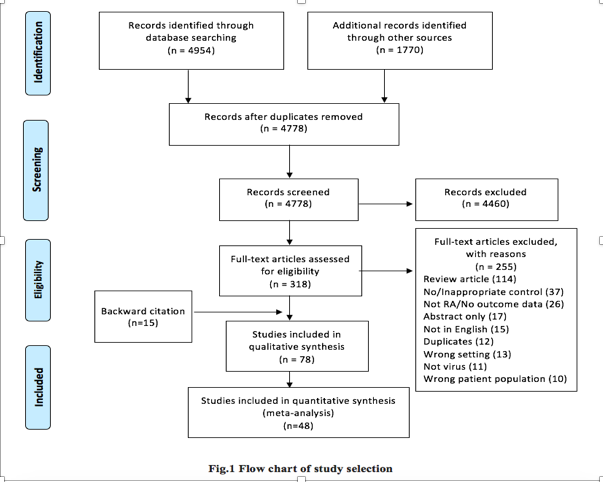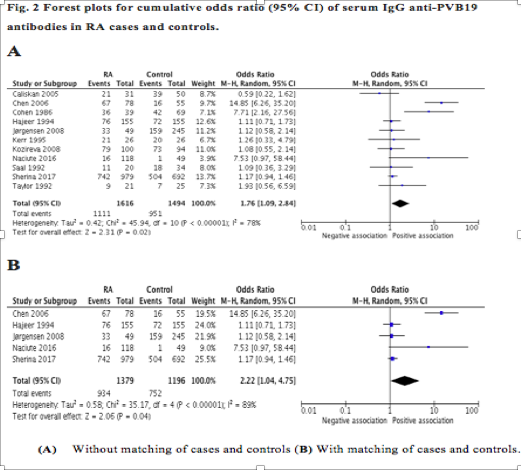Session Information
Session Type: ACR Poster Session A
Session Time: 9:00AM-11:00AM
Background/Purpose: Rheumatoid arthritis (RA) is an autoimmune disease with a complex etiology. Infections are viewed as environmental triggers of RA.
Different viral exposures have been implicated in the etiology of RA via several mechanisms of immune activation, such as molecular mimicry. The purpose of this systematic review was to summarize the evidence relating to the association between putative viral exposures and RA.
Methods: A systematic literature search was conducted using MEDLINE-OVID, EMBASE-OVID, PUBMED and Cochrane library databases. Articles were included if they were case-controls, cross-sectional or cohort studies and were published in English.
Results: Of 6724 citations, 78 studies were selected for review, 48 were meta-analysed (Figure 1). Studies had poor quality. Based on the IgG antibodies and viral DNA, the odds of parvovirus B19 (PBV19) infection were increased in RA patients compared to controls (odds ratio (OR) (95%CI) = 1.77 (1.11; 2.80), p=0.02, OR (95% CI) = 3.53 (1.00; 12.53), p=0.05 for PVB19 IgG and DNA, respectively) (Figure 2). For Epstein-Barr virus (EBV), patients with RA had not significant OR of anti-Epstein-Barr nuclear antigen (EBNA) (N=17 studies, OR (95% CI) = 1.05 (0.79; 1.39), p = 0.75), but significant OR of anti-viral capsid antigen (VCA) (OR (95% CI) = 1.5 (1.07; 2.10), p=0.02) and anti-early antigen (EA) (OR (95% CI) = 2.74 (1.27; 5.94), p=0.01) (Figure 3). Cytomegalovirus (CMV) was not associated with RA (OR (95% CI) = 1.24 (0.78; 1.95), p=0.36). Chronic hepatitis B (HBV) was not associated with RA in 5 case-control (OR (95% CI) = 1.37 (0.83; 2.25, p=0.22) and 1 cohort studies (HR 1.09 (0.74, 1.63), p>0.05). Chronic hepatitis C (HCV) was associated with increased risk of RA in 7 case-control studies (OR (95% CI = 2.82 (1.35; 5.90, p=0.006) and 1 cohort study (HR 2.03 (1.27, 3.22), p<0.01). There is a risk of persistent arthritis after Chikungunya fever (OR (95% CI) = 90 (15.2; 134.3)).
Conclusion: Studies about the risk of RA after viral exposures suffer from inconsistent methodological quality. There is a risk of RA after PBV19 infection and possibly HCV but not EBV or HBV. Chikungunya virus is associated with the persistent inflammatory arthritis.
To cite this abstract in AMA style:
Kudaeva F, Pope JE, Speechley M. Viral Exposures As a Risk Factor for Rheumatoid Arthritis: Summarizing the Evidence [abstract]. Arthritis Rheumatol. 2018; 70 (suppl 9). https://acrabstracts.org/abstract/viral-exposures-as-a-risk-factor-for-rheumatoid-arthritis-summarizing-the-evidence/. Accessed .« Back to 2018 ACR/ARHP Annual Meeting
ACR Meeting Abstracts - https://acrabstracts.org/abstract/viral-exposures-as-a-risk-factor-for-rheumatoid-arthritis-summarizing-the-evidence/



